Note: This post may contain affiliate links which means if you click on a link and purchase an item, we will receive an affiliate commission at no extra cost to you.
This post is brought to you a book Katherine co-wrote: The Digital Nomad Survival Guide, and by a few of her essential nomading items: a kindle, travel yoga mat, and a rain jacket.
This is the latest interview in a series featuring digital nomads talking about their lives and lessons (click here if you want to be interviewed). The goal is to help demystify the process of making money online, wandering the world, and living an unconventional life!
Katherine has a fantastic story of working in the corporate world but realizing it wasn’t suiting her view of success. She’s now working remotely and has been to over 50 countries since 2014.
Thank you for sharing your story with Freedom Is Everything, Katherine!
Key takeaways from Katherine’s interview:
“The nice thing about working remotely & traveling is that my cost of living is totally flexible. On a tight budget, I can stay with friends or family or find a low-priced apartment or room in an affordable country (I hate the word cheap).”
“An important note is that my idea of ‘success’ is that I don’t prioritize specific career or financial goals, just different experiences, so *I* feel very successful, but I’m not classically successful: important or rich.”
“I had already practiced eating meals by myself over the years, but it was in Luang Prabang that I really found the ability to be alone and quiet. Yes, I had an iPhone and internet and was working remotely, but I wasn’t online 24/7 the way I am now. If I wasn’t working, I was offline. And I discovered a new way to talk and listen to myself. I learned that I actually did have some creative ideas — some voice inside of me that was connecting different dots & drawing insights.”
“As a lifestyle, nomading is actually more like normal life than you might imagine but heightened and compressed. Your senses are often being overwhelmed by new & different inputs around you, you are still working so your free time is incredibly valuable & there’s pressure to spend it well, and all the daily life things are no longer easy second nature. That is all, of course, part of the adventure and what makes it a compelling lifestyle, but it also means it’s more tiring and demanding than it seems at first glance.”
Table of Contents
Introduce yourself! 🙂 Who are you? What do you do for work? And what is your nomadic story?
I’m Katherine Conaway, originally from Fort Worth, Texas — recently back due to the pandemic, but otherwise have been traveling full time since 2014 and working remotely.
I am a freelance writer & marketing consultant and the founder of Conaway Creative. My work with clients has evolved over the years — at the moment, I’m doing a lot of strategy work (either helping clients who have newer businesses or ones needing to update their content & marketing) as well as the full execution of new websites (planning, content development, writing, and some design, but no coding).
My work and scope is always changing based on what people need, though. I’ve been a Head of Production and a Head of Content, and I’ve worked with entrepreneurs as well as international businesses. Clients have included Bluffworks (travel clothing), BrewDog (craft brewery), Public Persona (branding + design studio), Lauren Hom (letterer & illustrator), and many other entrepreneurs.
While on the production team at HUSH in Brooklyn, I worked on projects for The New York Times, Under Armour, IBM, AERIN Lauder, and more. Before working in the creative industry, I taught abroad at American schools in Morocco, Switzerland, and Bulgaria.
I started freelancing, working remotely, and traveling in June 2014, when I quit my job as a digital design producer in NYC. For the majority of that time, I’ve been a solo traveler – in Africa, Asia, Europe, and North & South America. Thus far, I’ve been to over 50 countries.
I am also the co-author of The Digital Nomad Survival Guide and the host & producer of the Modern Work Podcast.
What inspired you to start nomading? And how has nomading changed your perspective on life?
During college, I studied abroad in Siena, Italy, which was a really wonderful and immersive experience. I lived with a host family who didn’t speak English and cooked us amazing meals, took classes in both English and Italian, and got to travel a bit around Italy and Europe.
Entering my senior year at Williams College in 2008, the financial crisis had a big impact on the opportunities available. I also had no idea what I wanted to do anyway. I’d loved studying abroad, I majored in Art History (which I loved and gave me such useful skills), I had worked part-time at Williamstown Elementary, and I didn’t want to commit to working in NYC yet. So when I saw some older alums who were teaching abroad, I knew that was a great first job for me.
I went to the Search Associates spring job fair in Boston my senior year and took a one-year position as an intern math teacher at the Casablanca American School in Morocco. I liked what I was doing enough that I wanted to try it elsewhere, so I got a summer counseling job at TASIS Switzerland and then was an 8th grade English teacher at the American College in Sofia, Bulgaria.
I truly loved my experiences teaching & living abroad. It was such a rich experience on every level, and I’m so grateful for the insights I got into other cultures — specifically the Arab world, Islam, and Eastern Europe.
The main reasons I came back to the USA in 2011:
– I wasn’t sure if I wanted a career as a teacher, even though I loved it as a job and am passionate about education, so I wanted to get other work experience early in my 20s
– I loved living abroad, and I knew if I kept doing it, I’d never move back & I wanted to have some experience with life in America as a young adult
So in the summer of 2011, I moved to Austin, Texas, since it was a few hours from my hometown and was supposed to be a great place to live. I did not have a job when I moved in — just an apartment and some money saved from teaching (I didn’t earn a lot, but my cost of living was low, and hooray for my Williams College financial aid = low loans).
I got a part-time job as a Kaplan GRE tutor because I’d taken the test — mostly out of grad school app FOMO, and then realized I didn’t want $100K of grad school debt. Thank you, past me!! Maybe someday, when it’s not a financial nightmare. I applied to 100 jobs while in Austin and got zero. (It was awful, and I am very anti-traditional job apps because it’s a miserable & ineffective system.)
So I did my Kaplan gig, worked part-time at a restaurant (I’d been a server several times before during high school and college internships), and got a short contract (through a friend I met playing volleyball) doing market research for a wind energy development firm. After a year in Austin, while things were improving, I decided NYC would probably be the better place for me.
From 2012-14, I worked at HUSH, a digital design agency in DUMBO, Brooklyn, first as Production Coordinator and then as an Associate Producer. (See a few project examples in my portfolio.)
While I loved aspects of living in NYC, I also wasn’t in a situation that felt long-term for me: not ideal apartment, single, worked a lot of hours, wasn’t making tons of money, and I wasn’t sure production was the track I wanted to be on forever. My priorities in life aren’t as much career or financial goals; I’m more focused on experiences and trying new-to-me things.
So I started planning my exit, saving what little money I could (though I was living off less than $3000 / month). I gave my notice in May and left at the end of June 2014. Initially, I had just planned on traveling for a few months to visit friends & family, but I got some freelance work and decided to just keep… going… while I could afford to. And voila, it’s been seven years.
In 2015, a year into traveling full-time, I was in Hong Kong and feeling a bit worn out from all the movement and planning — I was in a new place almost every week on average. A friend emailed me an article about this new company, Remote Year, that had organized a group to travel the world for a year — they were doing exactly what I was doing, together.
I emailed the founder, then had a Zoom call from Vietnam and sent them a deposit for their 2nd group, called Battuta. Our itinerary for 2016-17:
Montevideo, Uruguay (Feb)
Buenos Aires, Argentina (Mar)
La Paz, Bolivia (Apr)
Cusco, Peru (May)
London, England (June)
Prague, Czech Republic (July)
Belgrade, Serbia (Aug)
Split, Croatia (Sept)
Kuala Lumpur, Malaysia (Oct)
Koh Phangan, Thailand (Nov)
Phnom Penh, Cambodia (Dec)
Ho Chi Minh City, Vietnam (Jan)
After Remote Year ended in January 2017, I went back to traveling solo. I liked the slower pace of RY (compared to how I was moving around before), so I have tried to do more 1-3 month stays since then — in Paris, Berlin, Siena, Mexico City, Montreal, Chiang Mai — though I do still visit some places for just a few days or weeks at a time.
When COVID happened, of course, everything changed. But even though I came back to the USA and isolated with my family since March 2020, I actually managed to move around every few months between my sister, dad, and mom, who all live in different states now. My mom, stepdad, and I also traveled by boat together for five months at the end of 2020.
Please tell us the detailed story of how you started your freelancing business.
While I loved aspects of living in NYC, I also wasn’t in a situation that felt long-term for me: not ideal apartment, single, worked a lot of hours, wasn’t making tons of money, and I wasn’t sure production was the track I wanted to be on forever.
So I started planning my exit, saving what little money I could (though I was living off less than $3000 / month). I gave my notice at HUSH in May and left at the end of June 2014.
An important note is that my idea of “success” is that I don’t prioritize specific career or financial goals, just different experiences, so *I* feel very successful, but I’m not classically successful: important or rich. Leaving NYC is a perfect example of how that’s not my priority because I could’ve been on track.
My first freelance gig was as Head of Production for Public Persona, a branding + design studio run by Sarah Ashman. She had freelanced at HUSH while I worked there, we became friends, talked about our work & lives, and when she heard I was leaving, she asked me to come on part-time to help manage her (then) new business.
It was already remote by default of her being in DC, clients spread across the USA, and me traveling. So I’ve been working on Zoom since 2014 (welcome, everyone else during the pandemic. I wish I’d invested!).
Initially, I had just planned on traveling for a few months to visit friends & family, but since I had some freelance work, I decided to just keep… going… while I could afford to. And voila, it’s been seven years.
The nice thing about working remotely & traveling is that my cost of living is totally flexible. On a tight budget, I can stay with friends or family or find a low-priced apartment or room in an affordable country (I hate the word cheap). When I have more budget available, I pursue bigger goals that require resources — a month in Paris, a nice apartment in Medellin or Mexico City or Montreal, etc.
Midway into 2016, a company called Bluffworks hired Public Persona for a branding project and photoshoot for their new blazer on Kickstarter. I worked on the project (remotely) that summer. In the winter, Sarah* suggested that Stefan (Bluffworks’ founder) hire me part-time since I was a freelancer. So in Dec 2016, I started working with Bluffworks & Stefan as one of my clients.
*Note: this is why good friends & coworkers & mentors are CRITICAL for your career.
Bluffworks is a (travel) clothing eCommerce company. My first role was working on their PR & press, coordinating with bloggers & journalists for product reviews & articles. In 2018, I helped the founder on a seed round of investment. Then I helped manage the first run of overseas production (clothing and digital design are nothing alike, it was so stressful). In 2019, I became the Head of Content — strategizing, planning, and writing all our website, product pages, blog, and newsletters — through Aug 2020.
So I’ve been freelancing since 2014, with two long-term retainer clients (Public Persona 2014-2017 and Bluffworks 2016-2020), and a mix of other clients — some are single consulting projects or making a website; others are ongoing but only on an as-needed basis.
I decided to make an LLC in 2020 as I was getting more business (esp pre-pandemic), sometimes hire freelancers to help on client projects, and am looking to grow my business to include more online workshops, courses, and products — especially as I make more art. I formed Conaway Creative LLC in March 2020 when I came back to the USA because of COVID.
Right now, I’m mostly working with clients to either do brand/marketing consulting (strategy & planning) or make websites on SquareSpace (strategy, design, and writing). But my work is always evolving & adapting to what people want & need. It’s evolved a lot over the years and will continue to. That’s why I enjoy it! Every client & project is different.
I have to be adaptable and flexible, both with my time and personal budget, but I much prefer it to a 9-5. Here’s a post I wrote on how to start freelancing and more on my digital nomad origin story.
What are the 2-3 favorite places where you’ve lived/traveled to and why?
I really struggle with this question because I genuinely enjoy everywhere I visit — even if I wouldn’t want to live there forever, I always find something interesting about the place, people, and culture.
I spent six months in Mexico City in 2019, and I really loved it — the area I lived in (Condesa) was beautiful, with tree-lined streets and a big central park. I had quite a few friends there, lots of good coffee shops & restaurants within walking distance, and I started working out with a local trainer who I continue to train with via Zoom since I left.
Mexico also has an incredibly rich culture and history, and having grown up so nearby in Texas, it was really interesting for me to feel so much familiarity and contrast at the same time. It gave me a lot of insights to better understand American (as in USA) history and culture, which I think is a really important part of traveling.
Another place at the top of my list in terms of cities I’ve spent more time in and could see myself living in is Berlin. I really love bigger cities because they offer so many different things in a dense environment, and Berlin is great because it’s more affordable and also actively evolving.
While I love Paris and would enjoy living there (especially because I speak the language somewhat), it’s a bit prohibitively expensive and is a hugely popular tourist destination. For now, Berlin has a lot of options, even though it’s definitely a more challenging place in several ways.
I studied Art History in college and am currently working on my own art practice, and Berlin feels like a place where I can access great art & cultural history in the institutional spaces, as well as active artists and local galleries. So it seems like somewhere I would have the opportunity to learn, grow, and participate in the arts scene.
As far as cuisine and other aspects of life, Berlin has so much amazing food from all over Europe and the world, from restaurants to farmer’s markets to street stalls. And, of course, tons of coffee shops, which I’m a big fan of.
On the flip side, a couple of places that I don’t think I would probably try to live in, but that really made an impression on me include Luang Prabang, Laos.
I visited Luang Prabang back in 2015 during my first long trip completely solo — I went to SE Asia for six weeks. I didn’t know anyone in the region (whereas up to then, I would usually travel somewhere and have at least one person I knew there).
I started in Hanoi, Vietnam, and went to Luang Prabang after about 10 days. It’s a pretty small town at the confluence of two rivers (one is the Mekong, which runs from China to the coast of Vietnam). It was occupied during & after WWII by quite a few different countries, so you can see some influence of that on the architecture, but I think it’s been largely locally ruled since the 50s (don’t quote me! I read the wiki but wasn’t super clear).
Anyway, so it was in Luang Prabang that I really found my footing as a solo traveler. I did some tourist sites — went to waterfalls, visited several temples, walked up Mount Phousi, did a kayaking trip, and went to the museum, ethnology center, and UXO (unexploded ordnance) visitor center. I learned a lot of information about the country’s history and the Vietnam War (throughout the trip), and it gave me a new perspective on the USA and our role in the world (now and historically).
But because it’s a fairly small town and I was there for a week, I had time to just bike around town and enjoy quiet moments. I took some yoga classes at an outdoor café overlooking the river. I found a company called “Backstreet Academy” (a precursor to Airbnb Experiences), where I was able to take a weaving class with a local woman at her home, and a high school student was provided to act as translator.
I had already practiced eating meals by myself over the years, but it was in LP that I really found the ability to be alone and quiet. Yes, I had an iPhone and internet and was working remotely, but I wasn’t online 24/7 the way I am now. If I wasn’t working, I was offline. And I discovered a new way to talk and listen to myself. I learned that I actually did have some creative ideas — some voice inside of me that was connecting different dots & drawing insights.
So some of that isn’t about LP specifically, but being in that environment for enough time on my own was a huge factor. I felt safe, it was relatively quiet, and I had the space in different respects to discover something new about myself. And so, I’ll always be really grateful for that trip and associate my creativity with LP.
What advice would you give to someone who’s thinking about nomading?
I have plenty of advice and stories about both budget and solo travel, as I’ve mostly traveled on my own and always track my spending based on my budget. (That said, I’m not a super thrifty backpacker; my approach is just conscious spending.)
The first thing is that it’s critical to know your finances and have some savings + a strict budget you can afford to live on for at least six months. It doesn’t have to be a ton of money, if you have a plan on how to live on only a little (like I did), but you need to know exactly what you can spend and that you have a cushion for the inevitable emergencies that will arise.
So make a budget in a spreadsheet. Define categories for everything you’ll spend money on, and estimate the total and daily amounts for each. Knowing the daily average you need to hit as well as totals is helpful so you can stay on track more easily. Know what you care about spending more money on – whether it’s accommodations, a few nice meals, a major activity, shopping, whatever.
In general, if you’re new to nomading, start with what you can. You don’t have to quit your job, move out of your home, and cross an ocean immediately. Take a long weekend trip somewhere nearby to try traveling alone. Plan 2-3 weeks to work remotely from a new location. See how you do with handling the logistics and being in a new environment. If you like it, then plan something a bit longer. My seven years on the road evolved from an initial 3-month trip.
For packing, I always pack everything of real value in my carry-on (electronics, medicine, at least one outfit, underwear, some toiletries), so lost baggage isn’t as big of a disaster. And don’t bring anything of value that you really won’t need or use! Also, most things are now available everywhere (for better or worse), so the odds are good you can get what you need wherever you go.
As a lifestyle, it’s actually more like normal life than you might imagine but heightened and compressed. Your senses are often being overwhelmed by new & different inputs around you, you are still working so your free time is incredibly valuable & there’s pressure to spend it well, and all the daily life things are no longer easy second nature. That is all, of course, part of the adventure and what makes it a compelling lifestyle, but it also means it’s more tiring and demanding than it seems at first glance.
When it comes to socializing, I’m fairly introverted and do not enjoy things like showing up to a party or a bar or a hostel to meet a group of random people. What I do like is chatting with baristas at cafes, for example, because I like to go work there and can usually easily ask them for advice on things to do. I like to sign up for group activities (cooking classes, hikes, art, whatever) and often meet other people. It helps me to have some connection like a shared interest or get introduced through another acquaintance, rather than meet total strangers.
I think it can be a tremendously valuable experience for growth, self-awareness, and understanding the world – especially if it’s approached consciously. It can be very challenging, whether adjusting to a different culture or managing your working time zones, or missing people you love, but it is also so rewarding. I really appreciate the opportunity to have so many new experiences so frequently, and I think I am well-suited for it because I’m very organized, responsible, curious, and adaptable. So if that sounds like you & what you want, then definitely worth pursuing.
Also, I literally co-wrote a book about all this (The Digital Nomad Survival Guide) so that I could pull together all my information + advice on this topic because it really is a LOT. To me, it’s important to explain the strategy + general ways I plan based on my priorities since that’s ultimately going to vary with each person.
There’s no one correct way to do it, which is great but also can feel intimidating. That’s why I always try to focus on being very clear on what I personally care about (and don’t), so I can make confident choices and end up happy with the results.
What is unique about the way you travel, and what advice do you have for someone that wants to travel with a similar style?
I guess it’s unique that I’m frequently changing scenarios — I’m not committed to all backpacking + hostels, or luxury travel, or groups only — I do a mix of everything.
For five months in 2020, I lived with my mom & stepdad (and our cat) on their boat, and we traveled down from New York to Florida along the East Coast. Obviously, that required a totally different approach to everything than when I spent three months living alone in an apartment in Siena, Italy, in 2018, for example.
But that’s what I like about this lifestyle — it’s so adaptable. I can travel alone, I can meet friends and family, I can join a group for a month (or a year), and I rotate through all of those options. Depending on location and preferences, I can find housing for $500 / month or $2000 / month. I can be in the Americas in the same time zones as work, or I can be in Europe or Asia and get to shift my schedule around, so the daytime is free for me to spend how I please. I can follow warm weather, or I can seek out certain seasonal experiences.
So my advice, again, is to think about (maybe journal) what you’re interested in and create a plan for 3-8 weeks of that, do your research, make a budget, go for it, and then reflect on how it went. Then you can decide if you want more of the same or time to try something different. It’s all an experiment!
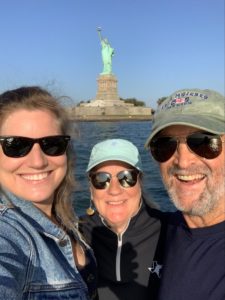
As a woman, what should other people who identify similarly (and who haven’t traveled much) know about traveling/nomading?
I don’t really think there are many places you can or can’t go as a woman or as a solo traveler — it’s more about your experience, comfort level, expectations, and lifestyle habits.
Most of the time, partially because I am working remotely and tend to prioritize daytime or early evening activities, I get home by 9-11 pm. Not being out late (or taking a taxi / uber home) means I am pretty much safe to be out anywhere — I say that with countries like Kenya, Vietnam, Colombia, India, Morocco, etc. in mind.
Depending on where I am, I might somewhat adjust what I wear, but generally speaking, my travel wardrobe isn’t too problematic for different environments. I always have a big loose scarf that I can use to cover my head or shoulders for religious or conservative environments (or if I’m cold, haha). I wear a lot of athleisure and dresses, and I typically stand out because I’m blonde and bigger than most women (5’6” and athletic), but I try not to dress in ways that would garner more attention than I’m already getting (victim blaming is BS but also we have to be careful because that’s reality).
I do identify as bisexual, but I’m also cisgender, mostly single, and don’t really try to hook up while traveling, so I can’t speak too much to the LGBTQ+ experience abroad or as a nomad. If I’m staying in a city for a few months, I’ll sometimes meet someone or use dating apps, but the most I can say is that dating while traveling hasn’t been super successful for me, which can be frustrating but I don’t think is specific to me vs. just being a challenge of dating for anyone.
Overall, I think you just have to reflect on what you feel comfortable vs. nervous about, make plans and choices so you can feel safe — where you stay (neighborhood and housing setup), your schedule, mode of transport, etc., and regularly evaluate how it is going. I think it’s good to push your boundaries a bit, but only in ways that bring you new insights or understanding, or opportunity, not actually risking your safety.
The more that I’m abroad, the more I appreciate experiencing different aspects of different cultures and countries — whether it’s local health care (I’ve been to doctors in Morocco, Bulgaria, Bolivia, Prague, Hong Kong, Thailand, Zambia, South Africa, Mexico, and Canada), safety (as a single woman, I’ve felt safest in Vietnam, Thailand, Singapore, Prague, France, England, Germany), or advertising (for example: not seeing so much sexualized media in Morocco, and generally not watching TV or offline news/media).
Since launching, what has been most effective to acquire/retain clients?
Happy clients and spreading the word! All of my work has come through people I met personally or referred to me by someone else.
I tell *everyone* that I meet that I’m a freelancer, not in an obnoxious way, but whenever we get to the subject of work, I make sure to let people know that I work in marketing & writing, that I’m adaptable to client needs, and am always available for new projects.
They almost never hire me in that moment, of course, but some people remember a bit about our conversation & reach out to me later. Or they mention me to a friend that’s looking for help on a project. But the majority of my work has come from working with someone and having them refer me to someone else.
I have a lot of conversations with people that * don’t* turn into clients because it’s not always the right time, budget, or scope, but I’m always happy to answer a few questions, provide some resources, and refer people to anyone who might be able to help (if I can’t solve their problem). But that practice is my new biz pipeline, and it gets enough “yeses” that I stay in business.
Once someone is a client, I work hard to deliver what we discuss. Part of that means I try to be very clear on the scope & explicitly write everything out upfront in my contract, I explain my rates & billing, and I stay on top of my project management. So I get my contracts signed and ensure their invoices are paid based on the predefined schedule. I send them project updates, hit my deadlines, and document any changes in writing. I treat my business like a business, because it is.
If you’re a content creator (podcaster, YouTuber, blogger, etc.), tell us about your content creation journey and share some of your favorite content that people should check out!
One of my favorite things about traveling and working remotely is that it’s helped me develop several passion projects — having a bit of structure or a goal (ex: write about the experience of being on Remote Year) helped me achieve a more regular practice of creating content.
A few examples:
A Remote Year — I made a publication on Medium where I could write & publish essays about the experience of being on Remote Year. Sometimes these were more FAQ style, some were city overviews (where we lived & worked), and some were more personal. I also posted a photo each day on my Instagram.
Since I finished RY, I have published much less frequently on Medium & Instagram and on a much broader range of topics in a variety of styles. It’s nice to explore different styles and what I feel driven to write about, but the framework of sharing a set experience was really helpful. (That said, I have been writing more lately.)
That project also led to me co-authoring a book, The Digital Nomad Survival Guide, with a fellow RY participant.
While on RY, I also started the Modern Work podcast as a way for me to both capture interesting stories I was hearing from other people as well as to develop a new skill (podcasting). It went on hiatus for a couple of years as I got busier with work, but I got back into it during the pandemic and hired an assistant editor, mostly because investing in paying someone helps ensure progress continues to be made.
So I’ve found it most helpful to either have some external framework in place (i.e., write about a specific experience on a certain schedule that aligns with its structure) and/or partner with someone else to keep each other accountable & hitting deadlines.
What digital tools do you use for your work/business?
I work primarily in Google suite (email, calendar, docs, sheets, slides), Evernote, Zoom, Adobe (Illustrator, InDesign), Airtable, and SquareSpace.
With different client teams, I use whatever apps they use — Slack, Asana, Figma, Mailchimp, Klaviyo, Gather Content, Basecamp, etc.
If you only had a few minutes to live, what are the most important life lessons you would share with the world?
I think many of the challenges we face right now are that people fundamentally don’t seem to realize how many of our issues center around safety, both physically and emotionally.
Yes, it might require a bit of additional effort or thought on our part (and sometimes financial loss), but if we really take the time to recognize how much safer we can make someone feel just by being more considerate in what we say, the words we do or don’t use, and recognizing others’ experience & perspective, I think we’d realize it’s well worth that small bit of attention for a few moments each day.
What do you travel with that you couldn’t imagine traveling without?
I am not an ultra-light traveler by any stretch. While I like the idea in theory, in practice, I like having more of my stuff with me, so I am more comfortable in different climates & cultural environments. I have the lifestyle stuff that makes me feel more at home wherever I am and that I can indulge in my hobbies.
Basics: phone + charger, computer + charger, kindle, travel yoga mat (YOGO), workout clothes, a few dresses, robe (lightweight but a personal necessity), sneakers, sandals, scarf, rain jacket, medicine, etc.
I now always have with me: journal(s) for my morning pages, watercolors, sketchbook, paintbrushes, pens, podcast mic, etc.
I wrote about my Remote Year packing list and have a chapter on packing in The Digital Nomad Survival Guide.
Overall, just travel with whatever you truly want and need, as much as you’re willing to personally carry around (a lot or a little, who cares if it’s only your problem to move it?), and also recognize that you can buy almost anything anywhere.
What is your philosophy on being happy and/or finding meaning/purpose in life? And any recommended resources for people navigating this journey?
Pay attention to the small details each day. Find moments of joy and beauty where you can (and they’re always there somewhere). Recognize that happiness is not a static state that you will ever achieve. And I say all of this as someone who struggles with depression and anxiety.
Read The Artist’s Way by Julia Cameron! Changed my life, not just creatively.
How can people learn more about you and your work?
Website: katherineconaway.com
Podcast: https://www.modernworkpodcast.com/episodes
Medium: https://katherinerc.medium.com/
Instagram: https://www.instagram.com/katherineconaway/
Boat travel: https://www.instagram.com/rosieandclarkeonaboat/


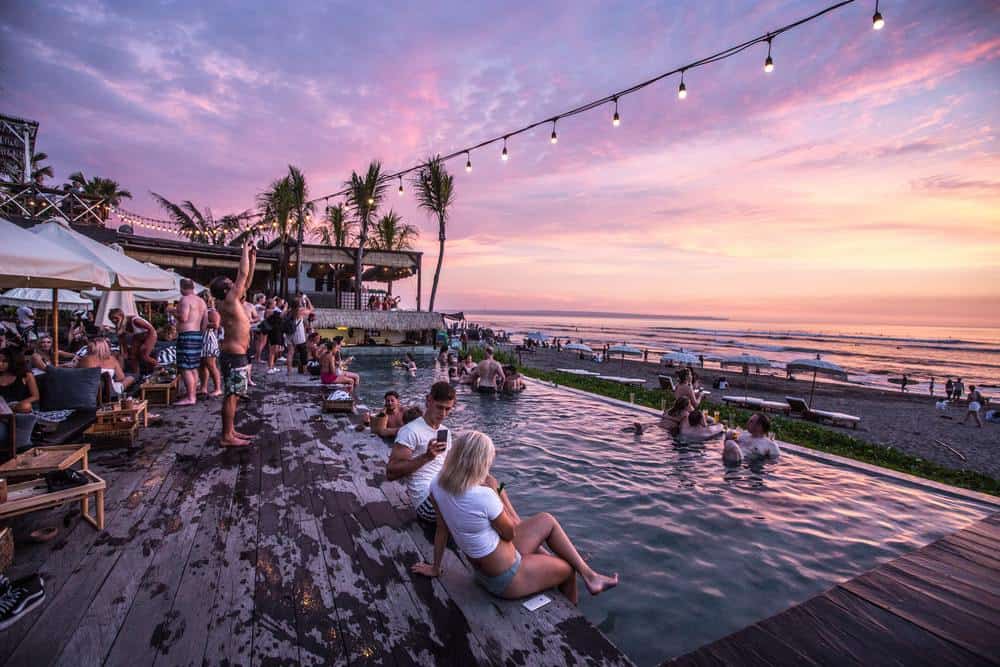
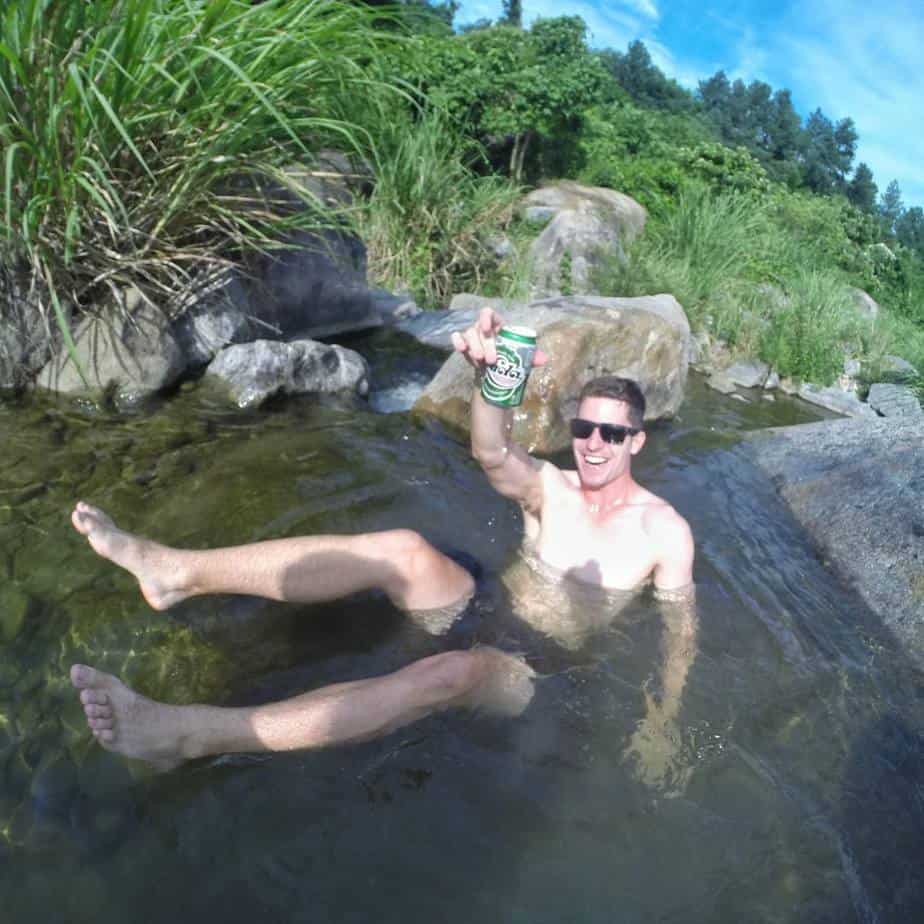
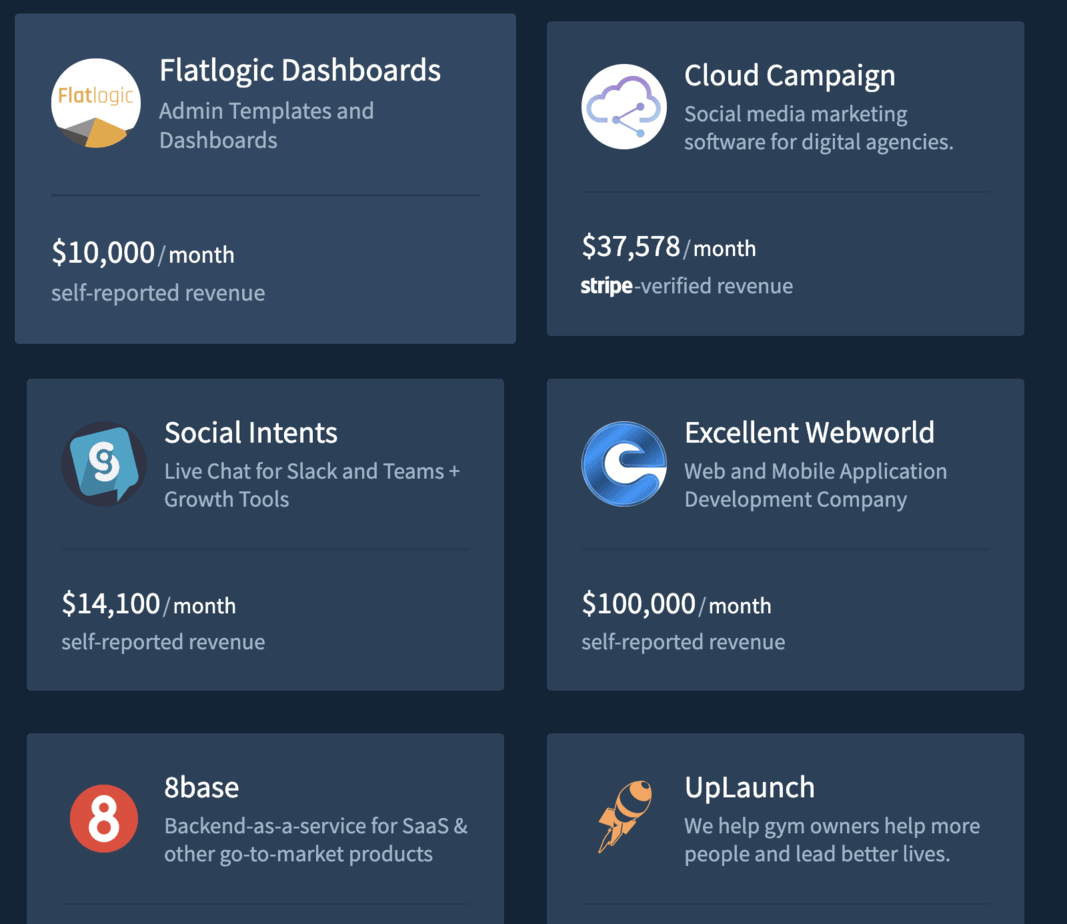
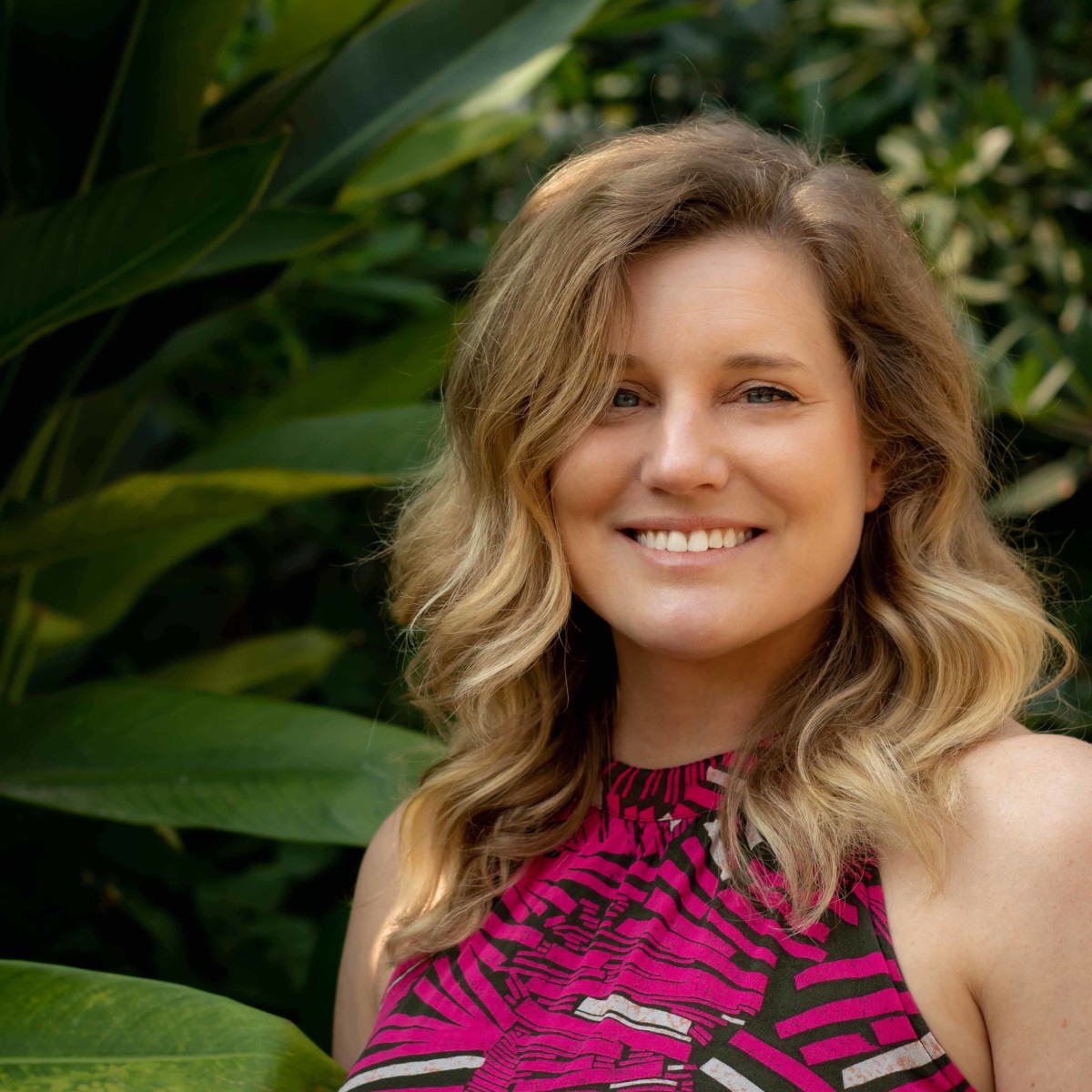







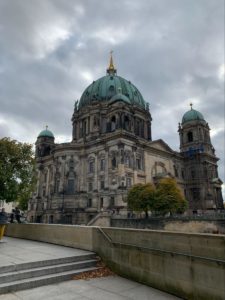
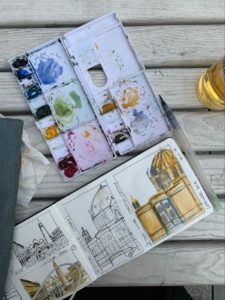


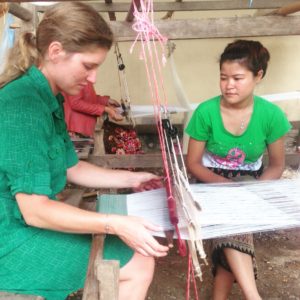
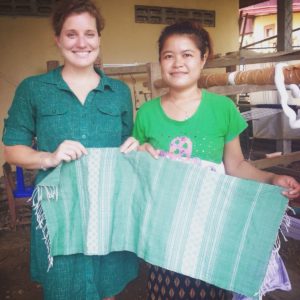
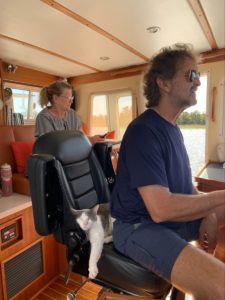

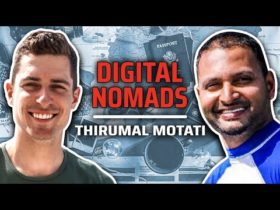
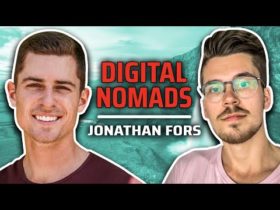
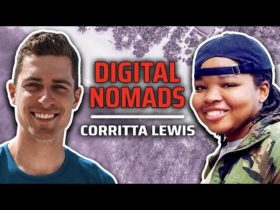
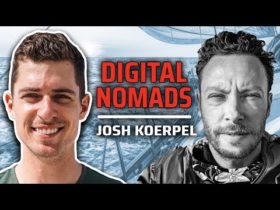
Leave a Reply
View Comments